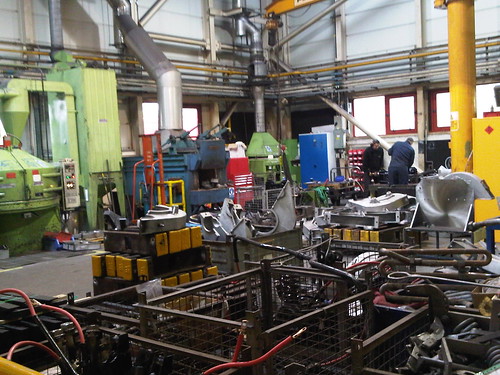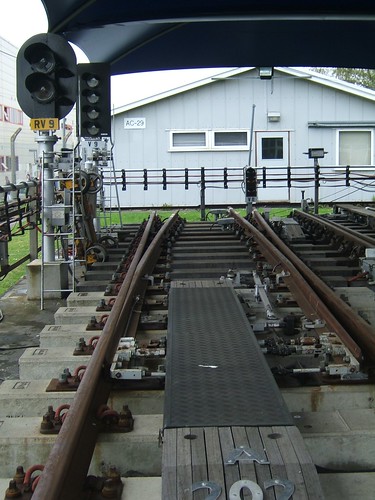
One corner of the Railway Engineering Works at Acton
Crewe, Swindon, Doncaster, Eastleigh, Acton - Acton? Perhaps Acton isn't one of the more famous railway works but London Underground established an important works at Acton. Mass transit sysytems are very intensively used and maintenance of rolling stock and infrastructure to the highest standards is essential.
My interest in Acton Works only started around 1995 when my firm became involved in work for London Underground, as described in the post London Underground and Jan. To be allowed 'behind the scenes' on any railway requires induction, safety training and various examinations matching the roles to be undertaken. An undergound fourth-rail electrified railway has particular risks and London Underground had a well-developed set of in-house training courses based at a Technical Training Centre at Acton Works. So I became a fairly regular visitor to Acton Works as I obtained different certifications and periodic re-certifications in connection with our work supplying Tunnel Telephone equipment, initially for the Jubilee Line Extension project and later for other London Underground lines. During these training visits, I saw glimpses of the work carried out around the sprawling Acton site, a mixture of old, modern and relocatable buildings.
Visits in 2006
During visits to REW Acton in connection with the design and supply of Tunnel Telephone equipment for a new installation at White City (necessitated by major changes to the London Underground depot in connection with the building of Westfield London Shopping Centre), I was able to take pictures of the external Signalling Training Facility that had previously intrigued me. Nearer the original Bollo Lane entrance to the site, a large concrete base provided with a fabric roof mounted an array of full-size working signalling equipment, including signals (colour light and disc shunting), point machines and train stops. On London Underground, points and train stops are electrically controlled but use compressed air to provide power, so the normal features of an air main running alongside the track provided with electro-pneumatic controls were also fitted. This allowing Signalling Technicians to receive training in maintenance of the various types of equipment in use on London Underground in a realistic environment supplementing training given in the adjacent Signal Training School, a large relocatable building provided with examples of various types of control system.

Signal Training facility, Bollo Lane, Acton with a variety of signals and air-operated points. The air main and control cables are along both sides, carried on posts.

View in opposite direction of Signal Training facility. Left: Colour light signals Right: Turnout. The gabled building in the background is the Signal Training School.
Tour in 2011
During another business visit in March 2011, one of the London Underground staff arranged a fascinating, although brief, tour of part of the works. There wasn't time to get a proper understanding of the variety of work undertaken but I quickly realised the expertise available on the site. Below is a small selection of the things I saw.
Repair and refurbishment of rolling stock equipment forms a vital part of the work. In the reception area of one modern building, a part-sectioned motor wheelset for 1983 tube stock and part-sectioned gearbox for 92 tube stock were displayed.

Motor Wheelset for 1983 tube stock (part sectioned) on display at REW Trains Division, Acton.
In the Traction Motor Section of the works, rows of motors were being processed.

Traction motor section, REW Acton
Nearby, a series of massive jigs were provided for working on the pre-wired underbody control sub-assemblies.

Underbody control sub-assembly, mounted on jig.
Various signalling equipment is maintained at Acton, including heavy items like trainstops and various types of electro-mechanical relays.

Trainstop complete assembly, REW Acton

Shop for re-certifying electro-mechanical signalling relays (REW Acton)
I hadn't realised that surface-mounted cables feeding signalling equipment were normally pre-fabricated in standard lengths including moulded terminations, minimising time-to-exchange when replacement was necessary. I think these cables were bought-in complete but REW Acton also acts as a central stores for London Underground.

Prefabricated multicore cable for signalling showing moulded termination for fast connection to 12 terminal posts (REW Acton)
On an intensive mass transit system, every minute counts and London Underground has always provided clocks on stations to assist passengers and staff. But I was still surprised by the variety of clocks being repaired and regulated in the Clock Section. At the time of my tour, London Underground still had a few mechanical clocks at stations requiring weekly visits for winding!

The Clock Section (REW Acton)
Redundant D78 vehicles
During my 2011 visits, I saw a redundant D78 vehicle leaving the works on a low-loader. At the time, I thought the coach was going for scrap but I discovered afterwards these trains had been bought by Vivarail for conversion into modern, lightweight diesel-electric units for use on heavy-rail infrastructure. I caught up with these former D78 vehicles on a visit in 2018 to Quinton Rail Technology Centre (there's a post on that visit here).

Redundant D78 vehicle leaving REW Acton on low-loader in 2011.
My pictures
Pictures at REW Acton.
Books
There's a book on Acton Works titled ‘Underground Train Overhaul – The Story of Acton Works’ by J. Graeme Bruce/Piers Connor, published by Capital Transport Publishing in 1991 (ISBN 1 85414 134 1).
